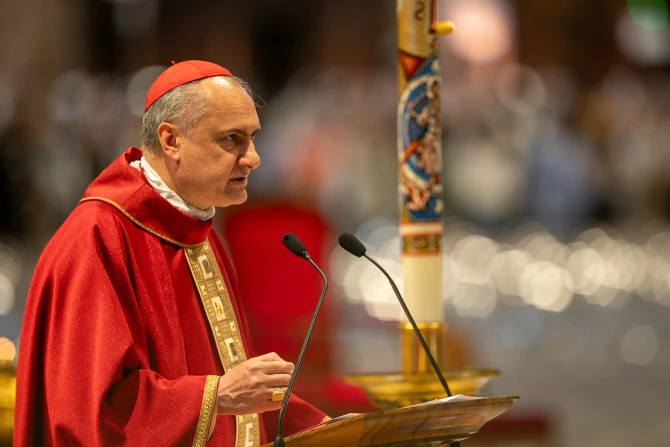
Editor’s Note: On April 29, 2025, Cardinal Mauro Gambetti, OFM Conv, archpriest of St. Peter’s Basilica, delivered the following homily during the fourth day of Novendiales Masses for Pope Francis. The text below is a CNA working translation of the Italian original published by the Vatican.
SIGN UP FOR OUR NEWSLETTER HERE
The Gospel passage is well known. A grand scene with a universalistic character: All peoples, living together in the one field that is the world, are gathered before the Son of Man, seated on the throne of his glory to judge.
The message is clear: In the lives of all, believers and nonbelievers alike, there is a moment of discrimination; at a certain point some begin to share in the same joy of God, others begin to suffer the tremendous suffering of true loneliness, because, ousted from the kingdom, they remain desperately alone in their souls.
The Italian translation (CEI) speaks of sheep and goats to distinguish the two groups. The Greek, however, alongside the feminine próbata — flock, sheep — uses èrífia, which indicates primarily goats, the males of the species. Sheep, who do not rebel, are faithful, meek, take care of the lambs and the weakest of the flock, enter the realm prepared for them since the creation of the world; goats, who want independence, defy the shepherd and other animals with their horns, jump over the other goats as a sign of dominance, think of themselves and not the rest of the flock in the face of danger, are destined for eternal fire. It is natural to ask: On a personal and institutional level, which of the two styles do we embody?
Clearly, then, whether or not we belong to the kingdom of God does not depend on explicit knowledge of Christ: Lord, when did we see you hungry... thirsty... a stranger... naked... sick or in prison? In the Greek text, the verb “to see” is expressed by Matthew as òráo, which means to see deeply, to perceive, to understand. Paraphrasing: Lord, when did we “understand,” “detect,” “distinguish” you? Jesus’ answer suggests that it is not the profession of faith, theological knowledge or sacramental practice that guarantees participation in God’s joy, but qualitative and quantitative involvement in the human story of the least of our brothers and sisters. And the price of the human is the kingship of Jesus of Nazareth, who in his earthly life shared in all the weakness of our nature, even to the point of being rejected, persecuted, and crucified.
Ultimately, the parable of the Last Judgment manifests the secret on which the world stands: The Word became flesh, that is, “God wanted to make himself in solidarity with humanity to such an extent that whoever touches man touches God, whoever honors man honors God, whoever despises man despises God” (Elias Citterio).
Indeed, the parable reveals the supreme dignity of human acts, defined in relation to compassion, solidarity, tenderness, and closeness in humanity. I find in the verses with which Edith Bruck wished to bid farewell to Pope Francis (L’Osservatore Romano, April 23, 2025), the poetic expression of such humanity:
“We have lost a man who lives in me.
Clearly, then, whether or not we belong to the kingdom of God does not depend on explicit knowledge of Christ: Lord, when did we see you hungry... thirsty... a stranger... naked... sick or in prison? In the Greek text, the verb “to see” is expressed by Matthew as òráo, which means to see deeply, to perceive, to understand. Paraphrasing: Lord, when did we “understand,” “detect,” “distinguish” you? Jesus’ answer suggests that it is not the profession of faith, theological knowledge or sacramental practice that guarantees participation in God’s joy, but qualitative and quantitative involvement in the human story of the least of our brothers and sisters. And the price of the human is the kingship of Jesus of Nazareth, who in his earthly life shared in all the weakness of our nature, even to the point of being rejected, persecuted, and crucified.
Ultimately, the parable of the Last Judgment manifests the secret on which the world stands: The Word became flesh, that is, “God wanted to make himself in solidarity with humanity to such an extent that whoever touches man touches God, whoever honors man honors God, whoever despises man despises God” (Elias Citterio).
Indeed, the parable reveals the supreme dignity of human acts, defined in relation to compassion, solidarity, tenderness, and closeness in humanity. I find in the verses with which Edith Bruck wished to bid farewell to Pope Francis (L’Osservatore Romano, April 23, 2025), the poetic expression of such humanity:
“We have lost a man who lives in me.
May Mary, the humble handmaid of the Lord who gave the world the Savior, point us to the way of authentic discipleship and proclamation.
This was originally published by CNA.








